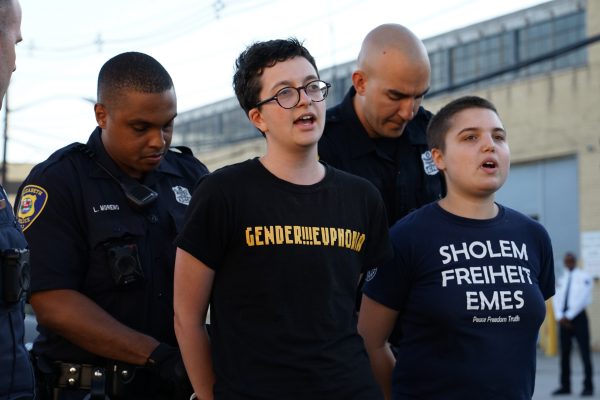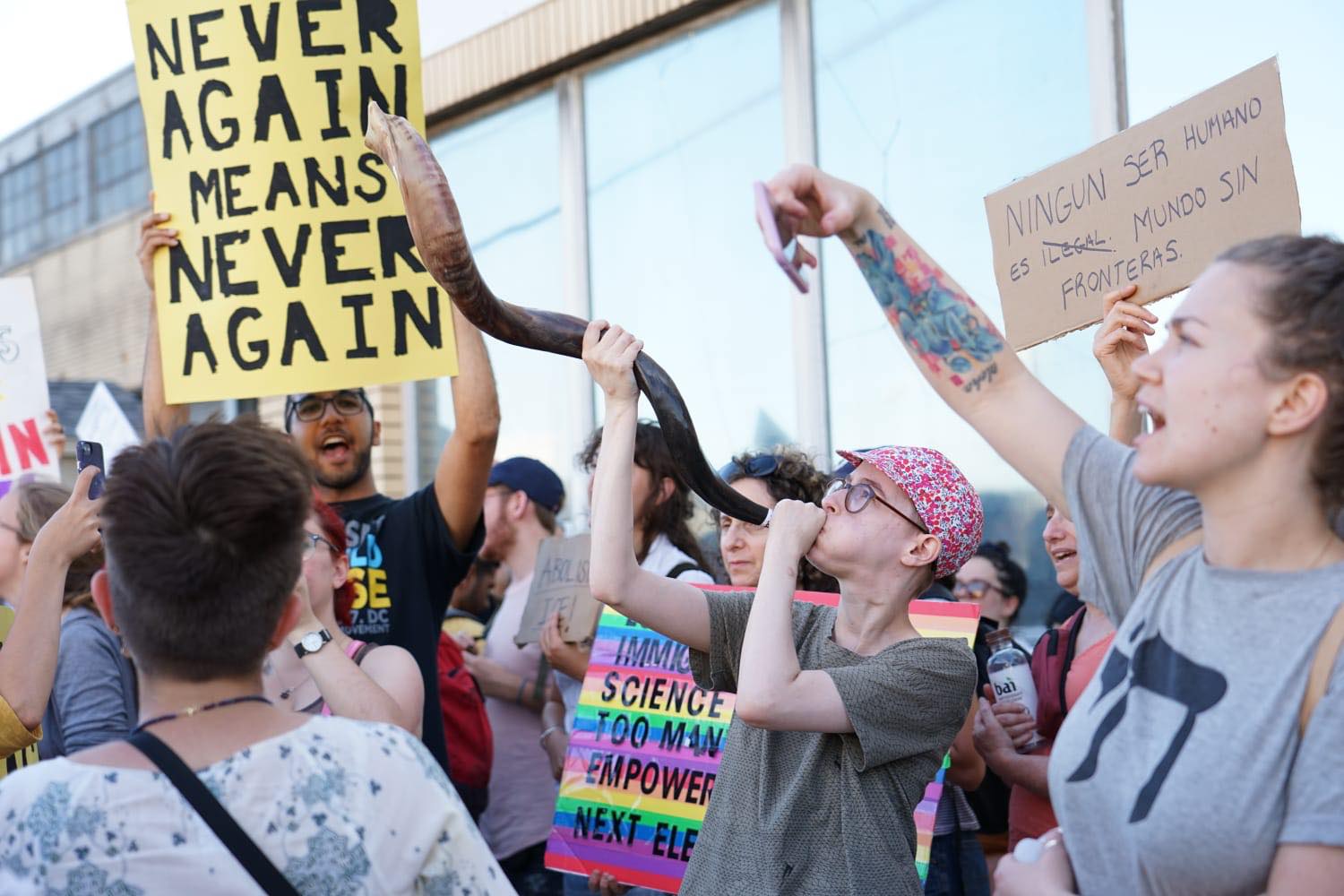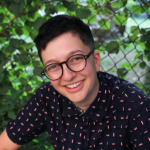
On Sunday, I was one of the 36 Jews arrested outside an ICE detention center in Elizabeth, New Jersey. Never Again Action, a mass mobilization of #JewsAgainstICE, organized the protest with Movimiento Cosecha, a movement fighting for immigrant rights and dignity.
I stood with other Jewish activists from across the country, linking arms and staring down a row of cops. Together, we blocked the entrance to the facility, preventing ICE agents from continuing business as usual. After more than an hour, our hands were tied behind our backs and we were loaded into police vans. In my van, my seatmate and I sang “Where You Go,” a song that takes its lyrics from the Book of Ruth (“Your people are my people, your divine my divine”).
By the time we were released from police headquarters, Rep. Alexandria Ocasio-Cortez had tweeted about us, writing, “Direct actions of profound solidarity, just like these, hold enormous power to change our country. Thank you @NeverAgainActn, for your courage, compassion, and selflessness in pursuit of justice.”
Since then, Never Again actions have sprung up across the country, from Providence to Los Angeles. Just this morning, 33 people were arrested in Philadelphia for interrupting the Independence Day Parade with a clear call: “Never again means close the camps.” I helped plan this action, and I’m still kvelling over all of the people who jumped into high-risk roles after experiencing a deep and disturbing feeling of recognition reading the news.
As a Jew, it’s necessary for me to show up for migrants and undocumented folks because I carry with me the parallel trauma of my own ancestors, who faced the escalating violence of discrimination, raids, family separation, imprisonment, and, finally, mass-extinction.
Instead of insisting that the term “concentration camps” must only refer to the Nazi Holocaust, as many of our Jewish communal leaders have done, we must instead widen the circle of our concern and open our eyes to the ways that state violence works to isolate and intimidate any group deemed “outsiders.”
At our protest, it felt radical and right to reexamine the lessons of my childhood, the insistence on Never Again, and to make it clear that Never Again must mean Never Again for anyone, not just ourselves.
As a trans person, I carry another history of targeted trauma, one that includes the Holocaust and extends far beyond it. I also carry with me the resilience of my people (Jews and trans folks and those of us in the crosscurrents), and all of the subversive creativity it takes for us to build a life outside of oppressive Western norms.
When I headed to New Jersey to join the protest, I put on a t-shirt made by my friend Taylor, an artist based in West Philadelphia. The shirt is black, with “Gender!!!Euphoria” written in yellow video game font. For many trans people, gender euphoria is a feeling of rightness and delight that comes with certain gendered experiences, like wearing make-up for the first time, or feeling the sun on one’s chest after surgery. While it might not seem obvious why I would wear this shirt to protest ICE, to me, it makes perfect sense.
First of all, immigration justice is a trans and queer issue, full-stop. Many trans and gender non-conforming people seek asylum in the United States, but face severe abuse in detention centers once they arrive. LGBTQ people are at a much higher risk of violence in these centers than their counterparts, and the risks to their health can come from sexual assault, punitive solitary confinement, and the withholding of necessary medication. In June, Johana Medina León, a transwoman from El Salvador seeking asylum in the U.S., died after asking for and being denied medical care. She was HIV-positive.
More broadly, I see gender euphoria as the feelings of rightness and delight that come with fighting for a more just world as my full self.
Gender euphoria is feeling connected enough to my body to put it on the line for the safety of others.
Gender euphoria is creating a world where women and trans folks in detention fear neither violence nor neglect.
Gender euphoria is creating a world without detention centers, prisons, or borders.
Gender euphoria is HIV/AIDS care and prevention for everyone.
Gender euphoria is health care for pregnant parents making a perilous journey for their families.
Gender euphoria is marching with my migrant ancestors in my heart, including the parents of my grandfather Daniel Steiker z’’l, whose name I bless myself with.
Gender euphoria is sitting on the floor of a cell with dozens of women and non-binary and trans folks and taking care of each other, offering what support we could with hands tied behind our backs.
Gender euphoria is standing tall as a trans Jew and putting all of my resources into the fight for justice. It’s hearing the call of the shofar, and the sound of my new name on my comrades’ lips, and knowing that I am in exactly the right place.
Lately, different people in my life have called me brave for taking steps to transition, come out, and advocate for myself. When I decided to risk arrest at the Elizabeth detention center, I heard that word again. Growing up, I was taught that bravery was a choice that an individual makes to do something scary but right.
For me, being out as a trans person and standing in solidarity with others are not choices. They are ways of living that allow me to access the fullness of my own humanity and history, and that of others. This way of living is expansive, a refuge from Mitzrayim, the narrow place. Here, together, there is safety, and joy.
Daniel Holtzman is the editor in chief of New Voices.

